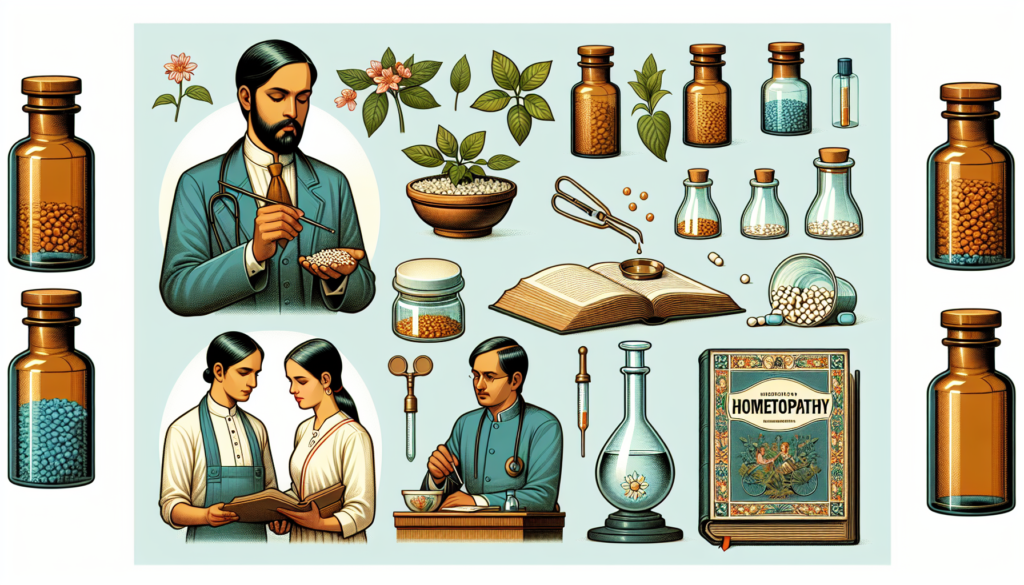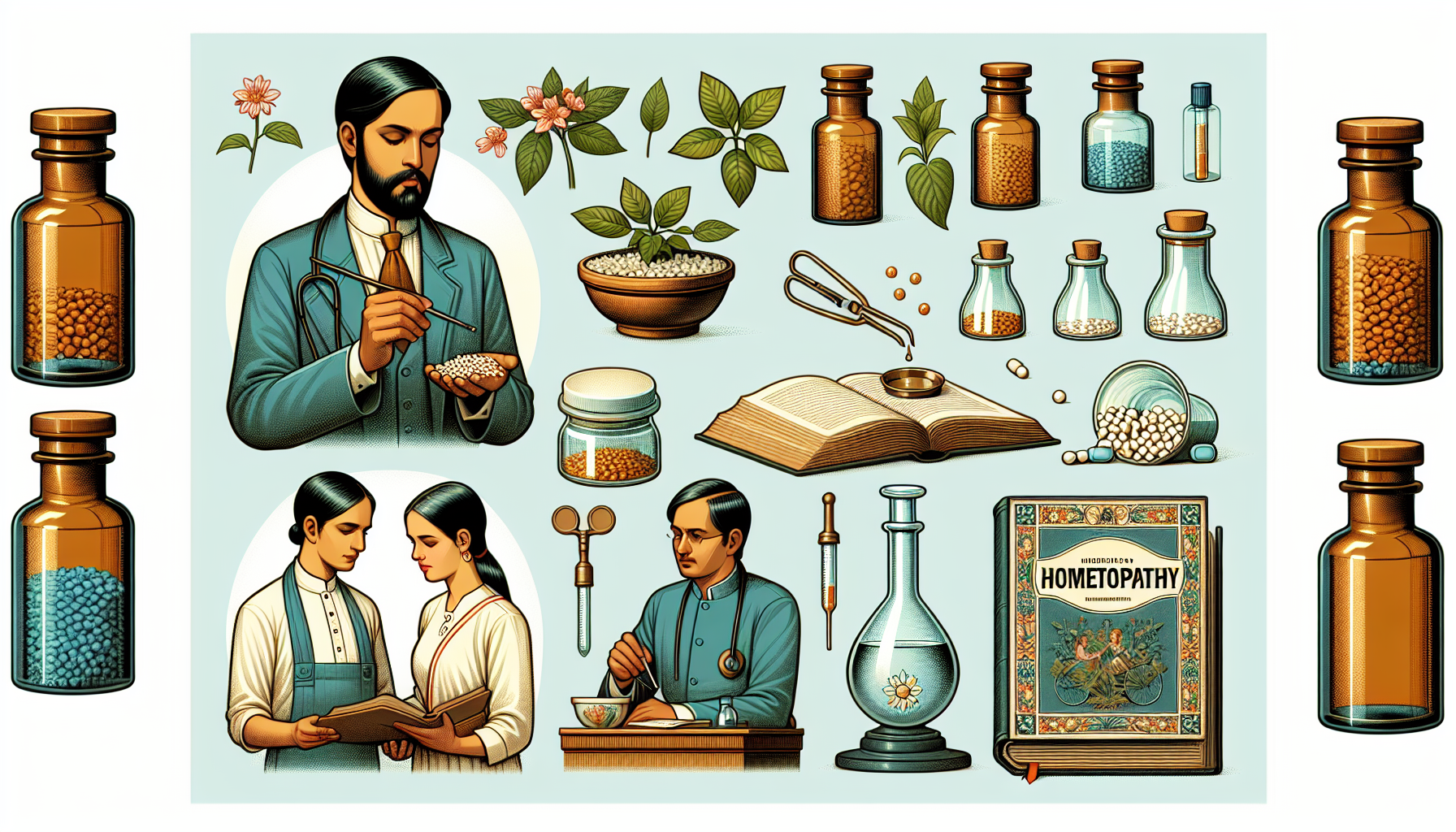Are you curious about the fascinating world of homeopathy? Look no further! In this article, you will discover an insightful overview of homeopathy and its principles. From its history to its approach towards illness, we’ll explore the foundations of this alternative medicine practice. Whether you’re a seasoned homeopathy enthusiast or simply intrigued by its holistic approach, this overview is sure to provide you with a comprehensive understanding of homeopathy’s intricacies. So, let’s embark on this journey together and explore the remarkable realm of homeopathy!
What is Homeopathy?
Homeopathy is a natural system of medicine that was developed over 200 years ago by Samuel Hahnemann, a German physician. It is based on the belief that the body has the ability to heal itself. Homeopathy treats the individual as a whole, taking into account their physical, mental, and emotional well-being. It is a gentle and non-invasive form of medicine that aims to stimulate the body’s own healing processes.
History of homeopathy
The practice of homeopathy dates back to the late 18th century. Samuel Hahnemann discovered the principles of homeopathy while translating medical texts. He was dissatisfied with the harsh medical practices of his time and began experimenting with small doses of medicinal substances. Hahnemann observed that these small doses could stimulate the body’s healing response and coined the term “homeopathy,” which means “similar suffering” in Greek. Homeopathy gained popularity throughout Europe and eventually spread to other parts of the world.
Principles of homeopathy
Homeopathy is based on two main principles: the law of similars and the potentization process. The law of similars states that a substance that can cause symptoms in a healthy person can be used to treat similar symptoms in a sick person. This principle is based on the idea that “like cures like.” The second principle, potentization, involves a process of dilution and succussion (vigorous shaking) of a substance to enhance its healing properties. The more a substance is diluted, the stronger it becomes in homeopathic medicine.
Homeopathic Medicines
Preparation of homeopathic medicines
Homeopathic medicines are prepared using a process called potentization. This process involves diluting a substance in water or alcohol and then succussing it, or shaking it vigorously. The dilution and succussion are repeated multiple times to enhance the medicinal properties of the substance. The resulting solution is then impregnated onto sugar pellets or tablets for ease of administration. Homeopathic medicines are available in various potencies, which indicate the degree of dilution.
Law of similars
The law of similars is a fundamental principle of homeopathy. It states that a substance that can produce symptoms in a healthy person can be used to treat similar symptoms in a sick person. For example, if a person is experiencing symptoms of sneezing, watery eyes, and a runny nose, a homeopathic remedy made from Allium cepa, or red onion, may be prescribed. Allium cepa can cause similar symptoms in a healthy person, and it is believed that it can stimulate the body’s healing response to relieve these symptoms.
Potentization process
The potentization process is a key aspect of homeopathy. It involves a series of dilutions and succussions which are believed to enhance the medicinal properties of a substance. The dilutions used in homeopathy are typically extremely small, often beyond Avogadro’s number, which means that there may be little to no trace of the original substance in the final remedy. Homeopaths believe that the energetic imprint of the original substance remains and is responsible for the therapeutic effects of the medicine.

Effectiveness of Homeopathy
Scientific evidence
The effectiveness of homeopathy has been a topic of much debate and controversy in the scientific community. While some studies have shown positive results, others have found no significant effect beyond that of a placebo. One challenge in evaluating the effectiveness of homeopathy is the individualized nature of treatment. Each person’s symptoms and constitution are taken into account, making it difficult to conduct large-scale, double-blind, placebo-controlled trials. More research is needed to fully understand the mechanisms and potential benefits of homeopathy.
Placebo effect
The placebo effect is a phenomenon in which a patient experiences an improvement in their symptoms after receiving a treatment that has no therapeutic value. Homeopathy has been criticized for its reliance on the placebo effect, as many of its remedies are highly diluted and may contain little to no active ingredient. However, proponents of homeopathy argue that the placebo effect is a valid and important aspect of healing and that it should not diminish the potential benefits of homeopathic treatment.
Personal experiences
Many individuals have reported positive experiences with homeopathy, citing improvements in their physical, mental, and emotional well-being. These personal anecdotes often form the basis for their belief in the effectiveness of homeopathy. While personal experiences cannot be considered scientific evidence, they provide valuable insights into the subjective experiences of individuals who have undergone homeopathic treatment. It is important to note, however, that personal experiences may vary, and what works for one person may not work for another.
Conditions Treated by Homeopathy
Acute illnesses
Homeopathy can be used to treat a wide range of acute illnesses, such as the common cold, flu, allergies, and digestive complaints. Homeopathic remedies are selected based on the individual’s symptoms and constitution. For example, a person presenting with a sore throat, fever, and fatigue may be prescribed a remedy such as Belladonna or Aconite. These remedies aim to stimulate the body’s natural defenses and support the healing process.
Chronic diseases
Homeopathy is also used in the treatment of chronic diseases, such as asthma, arthritis, eczema, and migraines. Chronic conditions often require long-term management and a holistic approach to treatment. Homeopathic remedies can help alleviate symptoms and improve overall well-being in individuals living with chronic diseases. The selection of remedies is based on the individual’s specific symptoms, their constitution, and any underlying emotional or mental factors that may be contributing to their condition.
Mental and emotional disorders
Homeopathy recognizes the interconnectedness of the body, mind, and emotions. It can be used to treat a range of mental and emotional disorders, including anxiety, depression, insomnia, and stress-related conditions. Homeopathic remedies aim to restore balance and harmony within the individual, addressing both the physical and emotional aspects of their well-being. The selection of remedies is based on the individual’s unique symptoms, personality traits, and emotional state.

Choosing a Homeopathic Practitioner
Accreditation and certifications
When choosing a homeopathic practitioner, it is important to look for accreditation and certifications. In many countries, homeopaths undergo rigorous training and education to become qualified practitioners. They may hold certifications or memberships with professional organizations that uphold high standards of practice. These organizations ensure that practitioners are competent and adhere to ethical guidelines.
Experience and expertise
Experience and expertise are important factors to consider when choosing a homeopathic practitioner. A practitioner with years of experience has likely encountered a wide range of cases and can draw from their knowledge and skills to provide effective treatment. Additionally, a practitioner who specializes in treating specific conditions or has expertise in certain areas may be more suited to address your individual needs.
Patient testimonials
Patient testimonials can offer valuable insights into a homeopathic practitioner’s effectiveness and expertise. They provide firsthand accounts of individuals who have undergone treatment with the practitioner and can give you an idea of the success rate and satisfaction of their patients. However, it is important to approach testimonials with a critical eye and consider multiple sources of feedback.
Homeopathy vs. Conventional Medicine
Different approaches
Homeopathy and conventional medicine differ in their approach to treatment. Conventional medicine often focuses on suppressing symptoms and treating the specific disease or condition. Homeopathy, on the other hand, takes a holistic approach, considering the individual as a whole and aiming to stimulate the body’s natural healing processes. Homeopathy also emphasizes the importance of the individual’s constitution and emotional well-being in determining the appropriate treatment.
Safety and side effects
Homeopathic remedies are generally considered safe when used as directed. They are prepared in highly diluted forms, which reduces the risk of toxic side effects. However, it is important to consult with a qualified homeopathic practitioner before using any homeopathic remedies, especially if you have any underlying health conditions or are taking medications. Like any form of medicine, homeopathy may have individualized reactions or rare side effects.
Cost comparison
The cost of homeopathic treatment can vary depending on several factors, such as the practitioner’s fees, the cost of remedies, and the frequency of consultations. Compared to conventional medicine, homeopathy may be more cost-effective in some cases, particularly for chronic conditions that require long-term management. However, it is important to consider the overall value and effectiveness of the treatment rather than solely focusing on upfront costs.
Homeopathy around the World
Popularity in different countries
Homeopathy is practiced and embraced by millions of people worldwide. It is particularly popular in countries such as India, France, Germany, Brazil, and Mexico. In India, homeopathy is officially recognized by the government and is integrated into the national healthcare system. France and Germany have a long history of homeopathy and a large number of practitioners. Homeopathy’s popularity in these countries is attributed to its effectiveness, accessibility, and cultural acceptance.
Regulation and legality
The regulation and legality of homeopathy vary from country to country. In some countries, homeopathy is recognized and regulated as a distinct system of medicine. In others, it may be considered a complementary therapy or fall under the broader category of natural medicine. Regulation often includes requirements for education, accreditation, and ethical standards for practitioners. It is important to familiarize yourself with the laws and regulations in your country or region when seeking homeopathic treatment.
Integration with mainstream healthcare
Homeopathy’s integration with mainstream healthcare systems varies across different countries. In some countries, such as India and France, homeopathy is integrated into the national healthcare system and is available through government-funded facilities. In other countries, homeopathy may be seen as a complementary therapy and is used alongside conventional medicine. The level of integration often depends on factors such as cultural acceptance, scientific evidence, and government policies on healthcare.
Controversies and Criticisms
Lack of scientific basis
One of the main criticisms of homeopathy is the lack of scientific evidence to support its effectiveness. Many studies have shown that homeopathic remedies have no significant effect beyond that of a placebo. Additionally, the dilution and potentization process used in homeopathy raise questions about the presence of any active ingredient in the remedies. Critics argue that any perceived benefits of homeopathy are simply due to the placebo effect or other non-specific effects.
Dilution and potentization
The process of dilution and potentization used in homeopathy has been a subject of controversy and skepticism. Critics question how a substance can become stronger or more effective when it is diluted to the point where no molecules of the original substance remain. They argue that the principles behind potentization defy the principles of chemistry and pharmacology. However, homeopaths believe that the energy and information from the original substance are retained and can have therapeutic effects.
Treatment delays and risks
Another criticism of homeopathy is that it may lead to treatment delays, especially in cases of serious or life-threatening conditions. Homeopathic treatment often takes a gradual and individualized approach, which may not be suitable for acute emergencies. Critics argue that relying solely on homeopathic treatment in such cases may deprive patients of timely and necessary medical interventions. It is important to seek medical advice when dealing with acute or severe conditions and to use homeopathy as a complementary therapy alongside conventional medicine when appropriate.
Homeopathy and Personalized Medicine
Individualized treatment
One of the key principles of homeopathy is the individualized approach to treatment. Homeopaths consider each person’s unique symptoms, constitution, and emotional state when selecting a remedy. This personalized approach allows for tailored treatment that addresses the specific needs and characteristics of each individual. By addressing the underlying causes of illness and supporting the body’s natural healing processes, homeopathy aims to restore balance and promote overall well-being.
Holistic approach
Homeopathy takes a holistic approach to health and well-being. It recognizes the interconnectedness of the body, mind, and emotions and aims to treat the individual as a whole. Homeopathic remedies not only target physical symptoms but also address the underlying emotional and mental factors that may be contributing to the illness. By restoring harmony and balance in all aspects of a person’s being, homeopathy seeks to promote lasting health and vitality.
Supportive care
Homeopathy can be used as a supportive therapy alongside conventional medicine to enhance overall well-being and improve treatment outcomes. Homeopathic remedies can help manage side effects of medications, alleviate symptoms, and support the body’s healing processes. By providing individualized treatment and addressing the unique needs of each person, homeopathy can offer additional support and promote a sense of well-being during conventional medical treatments.
Conclusion
Homeopathy is a natural and holistic system of medicine that has been practiced for centuries. It is based on the principles of the law of similars and the potentization process. While its effectiveness has been a topic of debate, many individuals have reported positive experiences with homeopathy. It can be used to treat a wide range of conditions, both acute and chronic, and offers an individualized approach to healing. When seeking homeopathic treatment, it is important to choose a qualified practitioner and consider it as a complementary therapy alongside conventional medicine.

